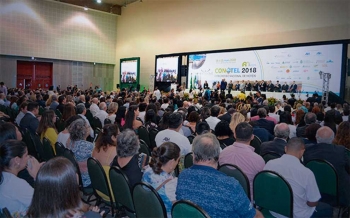The Director of FGV Social – Center for Social Policy, Marcelo Neri, gave a lecture at the opening ceremony of the 60th National Conference of Hotels – Conotel 2018, in Fortaleza. The meeting is one of the most traditional events of the hotel and tourism industry in Brazil. This year the conference brought together more than 4,000 participants and fostered exchanges among the industries related to Brazilian tourism. Neri was invited to speak at the event by Luis Gustavo Barbosa, who runs the tourism nucleus at FGV Projetos, addressing the topic “Socioeconomic Challenges and Receptive Tourism”.
“What are the two direct assets of tourism? In addition to physical infrastructure, nature and culture are also key elements when it comes to sustainability in the business. Investing in tourism helps offset poverty among the local population. But there are external problems, such as poor sanitation and trash on beaches, for instance”, said Neri, based on reviews from FGV Social.
“From 2008 to 2017, receptive tourism recorded growth in revenue mainly in Asia, compared to Africa and the Middle East. The market is now divided into 34% Europe and 34% Asia, which by now should have surpassed the old continent – the Americas had a 24% increase in the period. Regarding the tourism industry, Brazil has yet to prove itself, with only 6 million tourists per year – Mexico has 34 million and Canada has 18 million, despite the smaller population. Brazil has is very narrow-minded in this sense; the country has to be more open not only to tourism, but to immigration as well. Brazilian tourism grew very little between 2003 and 2017, driven by the major sporting events that the country hosted. We really need to develop our potential for tourism”.
Local data about the industry were also presented. According to Neri, the most participative state in terms of the performance of domestic receptive tourism in 2011 is Sao Paulo, with 20.6%. Rio de Janeiro and Santa Catarina come next, with 8.3% and 7.1%, respectively. Leisure still has more impact on tourism in the country, followed by the “threat” posed by competition, which is initially a positive aspect, but ultimately becomes predatory in the case of Airbnb, the largest hotel in the world.
Neri also pointed out the rise of the class C population. According to him, class C was the fastest growing segment in the country from 2003 to 2015, with the highest number of flights by people who had never traveled by this means. “Brazil’s problem today is that the inequality gap is widening. We need those in the tourism segment to have higher income. The Brazilian population grows 0.8% per year, and we need to establish the subgroups of this public, such as seniors and higher education students”. While showing population ageing projections, Neri spoke about the importance of senior tourism – a public with high income and available time.
“Brazil has the potential not only for receptive tourism, but other kinds as well. Above all, Brazilians are arguably the people that are most satisfied with their future life prospects, which showcases our ability to dream. But this can be harmful in terms of current investment in education, productivity or savings”. At the end of his presentation, Neri discussed the agenda for the industry, listing the key challenges to be overcome. “In the economy, we need to improve productivity, openness, fiscal adjustment, business environment and education. In receptive tourism, we must attack on five fronts: infrastructure, internet, taxes, equality with Airbnb, and social inclusion”.
The economist’s presentation is available on the website. Marcelo Neri also published a study on the subject, titled “Turismo Sustentável e Alivio à Pobreza (Tsap): avaliação de impacto de um programa de desenvolvimento ao turismo no Brasil” (Sustainable Tourism and Eradication of Poverty (Step): impact assessment of a tourism development program in Brazil), published on Revista de Administração Pública (Brazilian Journal of Public Administration) of the Brazilian School of Public and Business Administration (FGV EBAPE).





